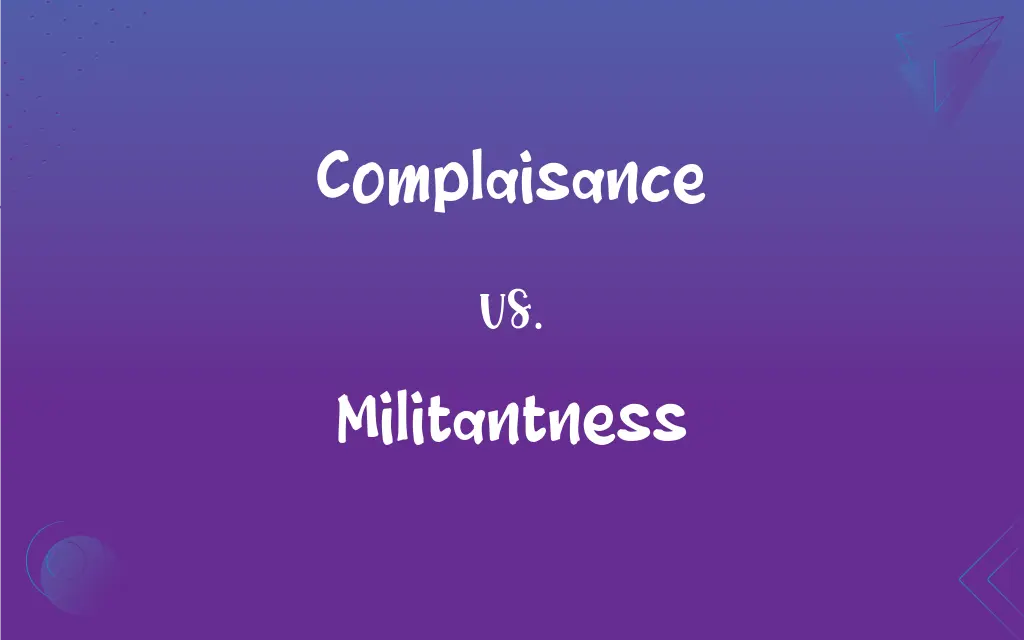Complaisance vs. Militantness: What's the Difference?
Edited by Aimie Carlson || By Harlon Moss || Published on January 25, 2024
Complaisance is the quality of being obliging and agreeable, while militantness is the state of being combative and aggressively supportive of a cause.

Key Differences
Complaisance embodies a willingness to please others and accommodate their preferences, often characterized by a gentle and agreeable disposition. In contrast, militantness involves a combative and aggressive approach, typically in support of a particular cause or ideology.
Individuals exhibiting complaisance tend to avoid conflict and seek harmonious interactions, prioritizing others' needs and desires. Conversely, those displaying militantness are more likely to engage in confrontational behavior, driven by a strong conviction in their beliefs.
In a social context, complaisance can lead to peaceful and amicable relationships, as it fosters understanding and cooperation. Militantness, however, often results in divisive and contentious interactions due to its confrontational nature.
Complaisance can sometimes be perceived as a weakness or lack of assertiveness, whereas militantness is often associated with strength and determination, albeit sometimes at the expense of diplomacy.
Complaisance is characterized by a disposition to accommodate and please, while militantness is defined by an aggressive and confrontational stance, often in defense or promotion of specific ideologies or goals.
ADVERTISEMENT
Comparison Chart
Connotation
Positive, seen as agreeable and cooperative
Often negative, seen as aggressive and confrontational
Interpersonal Dynamics
Favors harmony and avoids conflict
Often leads to conflict and assertive interactions
Perceived Strength
Can be seen as weakness or lack of assertiveness
Often viewed as strong-willed or determined
Approach to Conflict
Avoids and de-escalates conflict
Engages in and escalates conflict
Common Contexts
Used in social and diplomatic scenarios
Associated with activism and aggressive advocacy
ADVERTISEMENT
Complaisance and Militantness Definitions
Complaisance
Willingness to please others; obliging nature.
Her complaisance made her the favorite among her colleagues.
Militantness
Aggressively active in support of a cause.
His militantness in the campaign brought significant attention to the issue.
Complaisance
Tendency to conform or acquiesce to others' desires.
Her complaisance in family matters often led her to compromise her own wishes.
Militantness
Showing a fighting spirit; vigorously active.
The militantness of the protestors was evident in their unwavering determination.
Complaisance
Quality of being easygoing and accommodating.
His complaisance in accepting any task assigned made him a valuable team member.
Militantness
Advocating for a cause with intensity and passion.
His militantness in promoting animal rights led to widespread awareness.
Complaisance
A disposition to be agreeable and cooperative.
His complaisance during negotiations was key to reaching an agreement.
Militantness
Zealous and unyielding in pursuit of objectives.
The organization's militantness in environmental advocacy impacted policy changes.
Complaisance
Readiness to adapt oneself to others' wishes or needs.
The complaisance shown by the host made the guests feel welcomed.
Militantness
Combative and confrontational in approach.
Her militantness in debates made her a formidable opponent.
Complaisance
The inclination to comply willingly with the wishes of others; amiability.
Militantness
Militancy
Complaisance
The quality of being complaisant, amiable or agreeable.
Complaisance
Disposition to please or oblige; obliging compliance with the wishes of others; a deportment indicative of a desire to please; courtesy; civility.
These [ladies] . . . are by the just complaisance and gallantry of our nation the most powerful part of our people.
They strive with their own hearts and keep them down,In complaisance to all the fools in town.
Complaisance
A disposition or tendency to yield to the will of others
FAQs
What is militantness?
It refers to being aggressively assertive, often in support of a cause.
Can complaisance be a negative trait?
Sometimes, as it may lead to excessive conformity or lack of assertiveness.
Can militantness be effective?
Yes, it can bring attention and urgency to issues, though it may also cause conflict.
Does militantness imply violence?
Not necessarily; it can be non-violent but assertive and unyielding.
Is complaisance a form of weakness?
It can be perceived as such, though it often reflects a desire for harmony.
Can someone be both complaisant and militant?
It's rare as the traits often oppose each other, but it's possible in different contexts.
Does militantness always solve problems?
Not always, as it can sometimes exacerbate conflicts.
What does complaisance mean?
It's the quality of being willing to please or oblige others.
Is complaisance valued in the workplace?
Generally, as it fosters cooperation and harmony.
Are militant individuals always successful in their causes?
Success varies and depends on many factors, including the nature of the cause and approach.
Is militantness a form of activism?
It can be, particularly when used to aggressively advocate for social or political changes.
Does complaisance affect leadership?
It can, as overly complaisant leaders might struggle with assertiveness.
Can complaisance harm personal relationships?
It might, especially if it leads to one-sided compromises or lack of personal boundaries.
Can complaisance lead to being taken advantage of?
Yes, in some cases, people might exploit a complaisant individual's willingness to oblige.
Can complaisance be learned?
Yes, it can be developed through practices that enhance empathy and cooperation.
Are there any famous examples of complaisance?
Historical diplomats or negotiators often exemplify complaisance.
Can militantness be a positive trait?
Yes, when used to passionately and effectively advocate for just causes.
Are there situations where militantness is necessary?
Yes, particularly in situations demanding urgent action or advocacy.
How is complaisance viewed in different cultures?
It's generally valued, though the extent and interpretation can vary by culture.
Is militantness related to aggression?
It often involves an aggressive stance, though it should not be equated with harmful behavior.
About Author
Written by
Harlon MossHarlon is a seasoned quality moderator and accomplished content writer for Difference Wiki. An alumnus of the prestigious University of California, he earned his degree in Computer Science. Leveraging his academic background, Harlon brings a meticulous and informed perspective to his work, ensuring content accuracy and excellence.
Edited by
Aimie CarlsonAimie Carlson, holding a master's degree in English literature, is a fervent English language enthusiast. She lends her writing talents to Difference Wiki, a prominent website that specializes in comparisons, offering readers insightful analyses that both captivate and inform.






































































